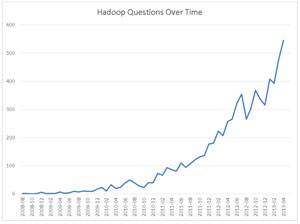Tracking Big Data Trends at Stack Overflow
You know Stack Overflow, of course (a recent
Slashdot.org posting was titled "Developers May Be Getting 50 Percent of Their Documentation From Stack Overflow").
So, while doing research for an upcoming article, I learned that StackOverflow.com (which says it gets more than 20 million visitors per month) could provide an interesting take on trends such as the move to Big Data, both from a job-seeking/recruiting point of view and by measuring the number of questions about the technology.
From the jobs/career aspect: "I ran a quick query through our database of 106,000 developer profiles (worldwide) and found that of these, less than 1 percent (only 951) have listed Hadoop as one of their technologies," reported Bethany Marzewski, marketing coordinator at the company.
"Comparatively, of the 1,589 job listings on our job board, a search for 'Big Data' returns 776 open roles--nearly 50 percent," she said. "A query for jobs seeking programmers with Hadoop experience yields 90 open jobs (nearly 6 percent), and a search for 'machine learning' yields 115 open roles." You can view the site's job board to run your own queries.
For the developer interest angle, Stack Overflow developer Kevin Montrose ran a query to chart questions on the site tagged with "Hadoop" for each month since 2008 (see Figure 1).
 [Click on image for larger view.] Figure 1. Hadoop Questions Over Time
[Click on image for larger view.] Figure 1. Hadoop Questions Over Time
The bottom line: The trend of companies adopting Big Data technologies--and resulting skills shortage--is huge and shows no signs of slowing down, so if you're a data developer looking for a pay hike, you may want to jump on board.
Have you been looking for a Big Data job? We'd love to hear about your experience, so please comment here or drop me a line.
Posted by David Ramel on 05/10/2013